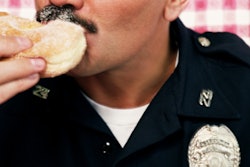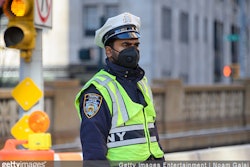With the continued spread of coronavirus—and the disease it causes, COVID-19—the world is slowly slipping into madness.
Earlier this week we reported that a woman has been charged with battery on a law enforcement officer after she claimed to be positive for COVID-19 before spitting on an officer who had responded to a domestic disturbance call on Sunday afternoon.
The subject—identified only as a 47-year-old woman being placed under arrest at the time of the incident—claimed that she was a carrier of the disease before spitting in the face of an officer with the Palm Bay (FL) Police Department.
Just a day earlier we reported that a teenage girl in South Carolina was arrested and has been charged with breach of peace high and aggravated after she reportedly intentionally coughed on officers, claiming to have the disease.
That very same day we reported that a former trooper with the Colorado State Patrol was handcuffed in front of his 6-year-old daughter on a softball field by officers with the Brighton Police Department who were enforcing "social distancing" rules. Shortly after the incident, the department apologized, calling the incident an "overreach by our police officers."
Hundreds of police officers across the country have been exposed to the disease, with nearly 200 reported cases in the state of Washington alone. Cases have also been reported in Florida, Texas, New York, New Jersey, Pennsylvania, Colorado, Massachusetts, and Virginia.
Tragically, we've also seen police officers die across the country from the disease—an estimated 20 officers have succumbed to COVID-19 in the past two months. In New York City alone there have been five officer deaths—a full 25% of all officer deaths nationwide.
Each loss causes pain for the friends, families, and fellow officers. This column is written in their honor.
Some Good News
There has been some good news, and some positive developments. We reported this week that an officer with the Dallas Police Department has recovered from COVID-19 and returned to duty.
The department wrote on Facebook: "The Dallas Police Department would like to welcome back our first officer who returned to duty today, after a full recovery from COVID-19. Welcome back Officer Walker!"
We also reported that all 6,500 officers with the Philadelphia Police Department were issued a cloth mask that they’re now required to wear on duty.
In California, the Santa Clara County Sheriff's Office has established a “Virus Response Team” that will maintain a tented area and adjacent shower trailer behind the agency’s training center for qualifying personnel to disinfect their gear and get cleaned up.
There was also news recently that Costco announced that health care workers, police officers, firefighters, EMTs, and other first responders will be moved to the front of any line to enter a Costco warehouse.
We also reported that officers with the Birmingham (AL) police department will receive hazard pay during the outbreak.
Individual Safety
Here are some reminders on staying safe amid the coronavirus outbreak.
Practice proper hygiene by promptly washing or sanitizing hands after coughing, sneezing, or physically interacting with another person.
Wash your duty gear and be meticulous about sanitizing your patrol vehicle after every transport.
Wear a mask—rated to N95 or higher—if coming into contact with someone who you suspect to be a carrier of COVID-19. Keep a good supply of disposable gloves—and practice proper procedures for the disposal of used gloves. Know how to properly use all of your agency-issued PPE, including isolation gowns or coveralls.
Wear eye protection. Sunglasses in daytime is fine but you may consider getting a pair of non-prescription eyeglasses for night time.
Get good rest and "listen to your body" in search of warning signs. Symptoms can include fever, fatigue, dry cough, difficulty breathing, and shortness of breath. Symptoms can appear within just two days of exposure, or can fester unnoticed for up to two weeks before manifesting.
Some carriers show no symptoms whatsoever.
Agency Response
Now is a good time to look into technologies that can increase efficiency, such as online crime reporting for minor crimes. Excellent platforms exist that can make it easy for individuals to self-report criminal activity from their locked-down homes. This helps to limit the amount of one-on-one interaction officers have with the public and frees up officers to respond to more serious incidents.
Now is also a good time to look into scheduling software that can help administrators put police in the places they're most needed at the times of highest activity. With staffing issues being what they are, it's even more important to manage your officers' workload.
Be good leaders. Officers are stressed, tired, overworked, and underappreciated—even by some command staff—so now is the time for police leaders to up their game in building morale and ensuring that the troops are well cared for.
Finally, watch for signs that one of your officers might have contracted the disease, and at the very first sign of a possible infection, send that officer home to be tested. Also, it's a good idea to ensure that every officer contact with a subject suspected to be a carrier of the disease be fully documented.
Connect with leaders at agencies in nearby jurisdictions to review your mutual aid agreements so that neighboring agencies can assist in response to crimes in progress.
Final Words
The U.S. Department of Justice said its paper entitled "The Role of Law Enforcement in Public Health Emergencies," that "public health emergencies pose special challenges for law enforcement, whether the threat is manmade (terrorist attacks) or naturally occurring (e.g., flu pandemics)."
This is undeniably true as officers across the country are dealing with a massive uptick in property crimes, domestic violence calls, and in some cases enforcement of "stay-at-home" orders. They're doing all this even as staffing shortages worsen with infected officers at home in quarantine.
Criminals are beginning to figure out that they can simply walk into a grocery or retail store, brazenly grab whatever they want, and walk past the security guards at the door who stand by and do nothing.
This is going to get worse—far, far worse—before it's going to get better, but contrary to what many in the mainstream media would have you believe, the world is not ending.
First of all, Americans are inherently resilient people, and like in the aftermath of Pearl Harbor and the 9/11 terrorist attacks, people pull together to address the matter at hand. Also, medical researchers are feverishly—no pun intended—looking for a vaccine. We are going to get through this—the question is, "When?"
Stay safe out there my friends.
















